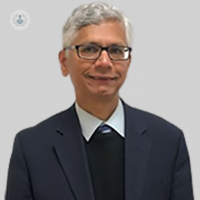An expert guide to psychosis
Written by:Psychosis is the medical term term used to describe various symptoms that affect a person’s perception and interpretation of reality.
Here, Dr Gopalkrishna Hegde, renowned consultant psychiatrist, provides a comprehensive insight into psychosis. The Northampton-based specialist discusses symptoms, causes and treatment, among other important points.

What is psychosis? What are the most common symptoms?
Psychosis, in very simple terms, is the loss of touch with reality.
Patients who experience psychosis sustain things through their belief, called delusions, where they have a different way of interpreting the world. They also sense things differently through their sensory systems, called hallucinations, that can manifest as hearing voices for example when nobody is around.
In addition, patients can also undergo a change in behaviour that is out of character, such as doing strange things, talking to themselves, running around in a bizarre way, and sometimes being aggressive. These are behavioural changes in addition to their belief and their sensory experiences. As well as this, there can also be a distinct change to their personality, which happens over a period of weeks and months.
Common symptoms of psychosis include:
- Believing in things that don’t exist or that don’t make sense to others. For example, believing that other people are going to harm them or believing that their partner is unfaithful, and making a connection between these beliefs and other things in their life.
- Perceptual experiences like hearing voices that don’t exist or thinking that they are being badmouthed or talked about by others around them, called talk commentary.
- Changes in behaviour that are out of character.
The symptoms of psychosis can happen gradually or acutely (all of a sudden), and can last for a long time.
What can trigger psychosis?
The trigger for psychosis is, quite often, driven by genetic (biological) causes. Likewise, organic causes can also be involved, where a brain or a physical health condition induces psychosis.
In addition, there can be stress-induced psychosis, where significant, severe stress makes people lose touch with reality, causing acute psychosis. Illegal drugs and substances and alcohol misuse can also cause psychosis.
Thus, a combination of multiple biological, psychological, social, stressor and traumatic factors can trigger psychosis. However, it is important to know that psychosis can also get worse, for example, if a person who has psychosis starts abusing cannabis. This can worsen existing psychosis.
How can psychosis be treated?
There have been lots of advances in the management of mental health conditions, though it is a relatively young science. There are various treatments available for psychosis, including:
- Biological treatments: These involve prescription drugs, mainly antipsychotic medications, but there are different varieties available.
- Psychological treatments: These involve therapies, like cognitive behavioural therapy for psychosis, that challenge certain beliefs and patterns of thinking. Within psychological treatments, there is family treatment as well using a family therapy behavioural model, because psychosis also has an effect on a patient’s family or carers. Different dynamics can set in within a family unit, which can be addressed with therapy.
- Psychosocial treatments: These involve consideration of social inputs, such as the patient’s relationship with their place of work and their employer, or the patient’s hobbies and activities, due to their role in a patient's rehabilitation process.
There are also immediate and long-term approaches. An immediate approach may start prescribing drugs, then start gradually exploring psychological means, and lastly, start introducing long-term rehabilitation options into a patient’s life.
Can psychosis be fully cured?
Historically, it used to be believed that about 1/3 of patients could be cured, 1/3 of patients’ psychosis could be managed effectively with long-term treatment, and 1/3 of patients’ psychosis would not change despite treatment. However, this is a very general view that should not be taken to heart because every patient has their unique strengths and challenges.
There have been lots of advances in the treatment for psychosis, and I think that many patients’ psychosis can now be managed effectively. Even if there are symptoms, there are ways to work with them.
In addition, psychoeducation has also increased throughout the years, and now both society and a patient’s family can work to offer a reciprocal adaptation to a patient’s needs. As a result, there is now a more cohesive approach towards a recovery model or rehabilitation report for the treatment of psychosis, which helps to enable a more optimistic view about the cure for psychosis.
What can I do as a family member to support someone suffering from psychosis?
There is a lot of literature about the family burden and the expressive emotions in the family, because families can become very overcritical or very overprotective of a patient who has psychosis, which can lead to a recurrence or relapse, or a prolongation, of the psychosis without much response. These kinds of family dynamics need to be addressed and treated appropriately through psychoeducation or with family therapy.
At a basic level, supporting a patient’s family, giving them a chance to speak and express their own needs, asking if they’re struggling, and directing them to appropriate help is helpful. There is a lot of psychosocial support available nowadays, with various specialist groups and carer groups that family members can turn to.
Working with a patient’s family is very important, because they are almost a doctor’s partners in managing the patient. Personally, in my practice, I really value supporting and working with a patient’s family members.
If you or a loved one are experiencing symptoms of psychosis, it is important to seek treatment as soon as possible. Early intervention can increase the chances of a good recovery.
Dr Gopalkrishna Hegde is a leading consultant psychiatrist with over 20 years’ experience in the treatment of psychiatric conditions. If you are concerned about psychosis, do not hesitate to book an appointment with Dr Hedge via his Top Doctors profile today.



